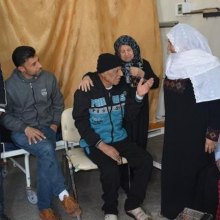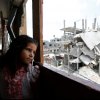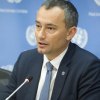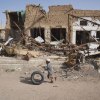
Gaza's cancer patients: 'We are dying slowly'
Gaza's cancer patients: 'We are dying slowly'
"I'm like a bird in a cage," Hind Shaheen told Al Jazeera as she lay in bed at Gaza City's Al-Rantisi hospital, surrounded by family members. "Outside of my cage I can see water and food, but I can't reach it. This is my condition right now."
The Gaza Strip does not have adequate resources to provide her with appropriate treatment, yet she cannot leave, as Israeli authorities at the Erez border crossing, known as Beit Hanoon to Palestinians, rejected her permit three times in a row without explanation.
Gaza has been under an Israeli and Egyptian blockade since 2007. The Erez checkpoint is the main exit for two million residents of Gaza, connecting them to medical care in Israel and the occupied West Bank.
"I can't go to Egypt either. The crossing closes for three, four months - so I'll be stuck there," Shaheen said.
Her struggle is familiar to thousands of patients in Gaza, where around 1,500 people are diagnosed with cancer each year. Chemotherapy drugs are not always available, nor are radiotherapy, molecular therapy, PET scans or isotope scans.
Gisha, the Legal Centre for Freedom of Movement, says that patients in Gaza have increasingly been blocked from leaving due to "security" precautions. Others are interrogated at the crossing or forced to wait lengthy periods of time for a response.
According to the World Health Organisation (WHO), approval rates for exit permits from Gaza dropped as low as 44 percent in October 2016, compared with 82 percent in 2014 and 93 percent in 2012.
An Israeli spokesperson from the Coordination of Government Activities in the Territories (COGAT) unit disputed this claim, citing an increase in the number of patients crossing Erez in recent years, from 22,380 in 2013 to 30,768 in 2016.
Aeshan says that he sees between 50 and 60 patients a day, and only half of them can receive their chemotherapy treatment in Gaza. Around two-thirds of cancer patients require radiotherapy treatment, and hundreds are referred for outside treatment in occupied East Jerusalem every month.
Due to the decade-long blockade, surgical skills in Gaza have been frozen in time. According to a 2010 report by the WHO, there are no specialist surgeons to treat oesophageal, pancreatic or lung cancer.
Before the start of the blockade in 2007, Gaza was the centre for medications, said Talha Ahmad, a chemotherapy pharmacist. He now describes his workplace at the hospital as a war zone.
There have also been reports of extortion of patients as they attempt to reach hospitals a short distance away for life-saving treatment.
Last July, 19-year-old Yousef Younis received a phone call from the Israeli security service after applying for a permit to treat his leukaemia in Jerusalem. They told him that he could cross if he collaborated with them. He refused, and consequently, his permit was denied. His health quickly deteriorated, and he died the next month.
Israel as an occupying force is obligated under international humanitarian law to ensure the Palestinian population's access to medical treatment and to maintain its medical facilities, hospitals and services in the occupied territories.
Gisha found that whenever they challenged a denied permit legally or through media work, Israeli authorities would reverse their decision and grant a travel permit. "This calls into question the arbitrary and slack decision-making process for assigning a security block in the first place," Gisha noted.
This is a summary of the news, for details go to: http://www.aljazeera.com/indepth/features/2017/01/gaza-cancer-patients-dying-slowly-170115120725304.html
 Reload
Reload



